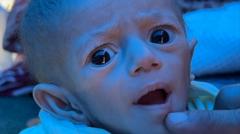The image is haunting; children sit still amidst the devastation, their spirits dimmed by the reality of existing in a world filled with loss and uncertainty. In Gaza, where survival becomes a daily battle, the haunting echoes of war overshadow the innocence of youth. In the midst of this bleak picture, special correspondent Fergal Keane reports on the plight of baby Siwar Ashour, whose malnourished state reflects a broader humanitarian crisis triggered by the ongoing Israeli blockade.
Caught in a cycle of inadequate nutrition and fear, Siwar's frail body, weighing just 2kg at five months, underscores the dire conditions faced by countless families. Her mother, Najwa, battles to provide for her daughter while coping with her own malnourishment. The rare formula provided to them by hospital staff—one can—has begun to run out, halting any improvement in the baby’s condition. "The situation is very dire," Najwa laments, revealing the grim reality for families who are becoming increasingly trapped.
As Israeli bombardments continue and the call for evacuations intensifies, families like Najwa's are left wandering through devastated neighborhoods, many relegated to makeshift living conditions, navigating life with precious little food and resources. The fear of bombardment hangs like a cloud overhead, a constant for both mother and child as they struggle just to maintain a semblance of normalcy.
Aid agencies are sounding alarms over the existing food shortages, contradicting claims from Israeli military sources. UN Secretary-General Antonio Guterres has depicted the situation in Gaza as one of extreme deprivation, and as the days drag on, families like Najwa's cling to survival amid deeply flawed assurances of aid that barely scrape the surface of the crisis.
In the backdrop of this humanitarian disaster, the deepening plight of Gaza's population forces them to abandon thoughts of a hopeful future, focusing merely on the present struggle for survival. Najwa poignantly states, "One does not think about the future or the past," a testament to the relentless nature of their fight against the odds in an ever-escalating conflict.
As the world watches, the stories of bravery and resilience persist amid the ruins, with little Siwar Ashour's fight for life emblematic of the overarching suffering of millions in Gaza.
Caught in a cycle of inadequate nutrition and fear, Siwar's frail body, weighing just 2kg at five months, underscores the dire conditions faced by countless families. Her mother, Najwa, battles to provide for her daughter while coping with her own malnourishment. The rare formula provided to them by hospital staff—one can—has begun to run out, halting any improvement in the baby’s condition. "The situation is very dire," Najwa laments, revealing the grim reality for families who are becoming increasingly trapped.
As Israeli bombardments continue and the call for evacuations intensifies, families like Najwa's are left wandering through devastated neighborhoods, many relegated to makeshift living conditions, navigating life with precious little food and resources. The fear of bombardment hangs like a cloud overhead, a constant for both mother and child as they struggle just to maintain a semblance of normalcy.
Aid agencies are sounding alarms over the existing food shortages, contradicting claims from Israeli military sources. UN Secretary-General Antonio Guterres has depicted the situation in Gaza as one of extreme deprivation, and as the days drag on, families like Najwa's cling to survival amid deeply flawed assurances of aid that barely scrape the surface of the crisis.
In the backdrop of this humanitarian disaster, the deepening plight of Gaza's population forces them to abandon thoughts of a hopeful future, focusing merely on the present struggle for survival. Najwa poignantly states, "One does not think about the future or the past," a testament to the relentless nature of their fight against the odds in an ever-escalating conflict.
As the world watches, the stories of bravery and resilience persist amid the ruins, with little Siwar Ashour's fight for life emblematic of the overarching suffering of millions in Gaza.




















